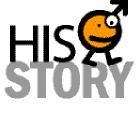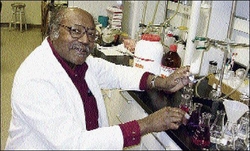

Nobel-Prize nominated Jamaican scientist Professor Bert Fraser-Reid in his laboratory at the Natural Products and Glycotechnology Research Institute at North Carolina State University, in the United States. - 2007 FILE PHOTO
"In the future, I will become a gynaecologist" and "I know I will be a horticultural engineer" are some of the introductory utterances students make on our local quiz shows. Some will achieve their goals; other won't, for various reasons. And there are many who simply go through life with that 'que sera, sera' attitude.
That perhaps was the approach taken by Professsor Bertram Fraser-Reid, a distinguished, world-renowned researcher in organic, synthesis and sugar chemistry, for, being a chemist of great repute did not cross his mind for a second, not even at age 21.
"At the age of 20, all I knew about chemistry was how to spell the word," he said.
Born in 1934, in a district near Coleyville, Clarendon, Bertram Oliver Fraser-Reid attended Clarendon College where physics and chemistry were not taught during his time. The staff resources were so poor that, in sixth form, two of his teachers were studying for the very subjects that he and his classmates were being prepared for. In fact, one of the teachers was repeating, having failed the year before.
Group effort
Fraser-Reid: "Instead of bemoaning our lot, my seven classmates and I consulted as many books as possible, and shared our information with one another. Today, five of the eight of us hold advanced degrees that rely heavily on chemistry and physics."
Fraser-Reid returned to Clarendon College, after graduating, as a junior teacher. The school subsequently got its first trained, qualified science teacher, whose favourite subject was physics. Fraser-Reid helped him set up the science labs, and got interested in chemistry. "So I went to a Sangster's Bookstore and bought Teach Yourself Chemistry. I was 21 years old, and was making my first contact with the subject."
One year later, with the assistance of his siblings, Fraser-Reid left on a one-way ticket to Canada and with only his first semester fees to study chemistry at Queen's University, in Kingston, Ontario, Canada, where he excelled beyond expectations. However, near to the end of his sojourn at Queen's, there was a snag. Not having ever studied physics was now an issue.
"I thought I was set to obtain my Bachelor of Science in May 1959. In February, the registrar called me in. She said that in going over my records, she had noticed that I had not taken any physics at Queen's, nor was there any physics on my high school transcript. I explained to her that physics was not taught at Clarendon College while I was a student there."
Genius
He was then told in no uncertain manner that he couldn't have got his degree without having done some studies in physics. The registrar then suggested that he go to a local high school to seek permission to study physics with a grade-13 class. The time frame between his final university exams and the grade-13 test was only two weeks. Nevertheless, he scored an A+ in the grade-13 test. To this he said he was not a genius, just that he was sort of prepared. Really!?
"The fact is that several of my chemistry courses required knowledge of elementary physics. So, I simply borrowed a Physics 101 textbook, and taught myself the physics I needed to understand my chemistry. So, in that two-week period before the Chem 13 exam, all I needed to do was disentangle the physics from the chemistry. A few weeks later, I attended convocation, picked up my certificate, and my cheques for graduate school."
Wow! He's a genius!
He graduated second in his batch, with a first-class honours degree, which earned him scholarships to do postgraduate studies. A master's degree (1961) in chemistry from Queen's, and a PhD (1964) from the University of Alberta were not the end of the road, nor was a fellowship from Canada's National Research Council to undertake advanced study in a lab of his choice.
He picked the laboratory of Nobel Laureate Sir Derek Barton at Imperial College of the University of London, England.
"The most beneficial interactions in the two years that I spent there were not necessarily from the contacts that I had with Sir Derek, but with the young men and women from all over the world who, like me, had come to sit at his feet.
Proud but humbled
"I am proud of this five-year odyssey, but I am also humbled by it. Had I gone off to university after leaving high school at age 17, I might never have pursued chemistry as a career. Fifty years later, my love affair with the subject continues to be intense. But just because I love the subject does not mean that I have always found it easy, nor that I enjoyed doing all that was required to advance my career in chemistry," Fraser-Reid said.
Whether he enjoyed certain aspects of his work or not, he has made significant contributions to the science of chemistry, and for his hard work and dedication he was widely recognised and rewarded. Some of his many accolades are Nobel Prize in chemistry nominee (1988), Senior Distinguished United States Scientist by the Alexander von Humboldt Foundation (1989), Jamaican National Foundation and the American Chemical Society Claude S. Hudson Carbohydrate Chemistry awardee (1990), National Organization of Black Chemists and Chemical Engineers' Percy Julian awardee (1991), Chair of the Gordon Conference on Carbohydrates (1993), Haworth Memorial Medal recipient (1995), Lectureship of the Royal Society of Chemistry (1995) and the Musgrave Gold Medal from the Institute of Jamaica (2007).
Versatile
And if you get the impression that the esteemed professor is a career lab rat, think again. Versatile is a word that describes the accomplished organist and pianist.
"I must not leave young people with the impression that success in one's career requires a rigid, one-dimensional focus. I was fortunate to learn at an early age that one can achieve competence in many things, if one goes from one activity to the next with a minimum of down time," he said.
At the International Symposium on Carbohydrate Chemistry at Stockholm in 1988, he was featured both on the scientific and cultural programmes. He gave a lecture and then an organ recital at St Johannes Cathedral. This duality was repeated in 1996 in Seville, Spain.
Since 1986, Fraser-Reid and his wife have been giving an award that includes a take-home trophy and a cash prize to the top student in chemistry at Clarendon College, where there were no chemistry and physics classes during his days.
"In view of how it all started, I consider myself fortunate and blessed to have been able to make a contribution to world-class science ... At age 21, I could have said I can't do chemistry, because I did not take it in high school. I am surely glad that I did not," Professor Bertram Oliver Fraser-Reid declared.
paul.williams@gleanerjm.com